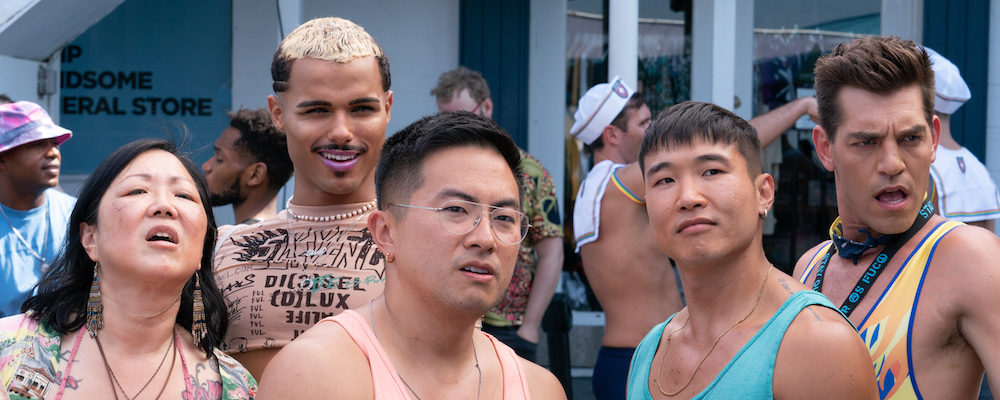‘Fire Island’: Jane Austen-Inspired Gay Rom-Com Holds Up and Subverts Tropes
Sandra Miska
“It is a truth universally acknowledged that a single man in possession of a good fortune must be in want of a wife.” So begins one of the most beloved novels of all time, Jane Austen’s “Pride and Prejudice,” and the gay romantic comedy “Fire Island,” the latest film to be inspired by the timeless love story. Noah (played by Joel Kim Booster, who also wrote the screenplay), is a Brooklyn-based free clinic nurse and our modern Elizabeth Bennet. He calls Austen a queen, but rejects her “hetero nonsense.” Noah is not wealthy, he certainly is not seeking a wife, or a boyfriend, for that matter, but love is on the horizon for himself, and for his more romantic best friend, graphic designer Howie (Bowen Yang), as they embark on a group trip to Fire Island, NY a favorite vacation destination for the LGBTQ+ community.
Noah and Howie bonded years ago over their shared experiences as gay Asian men, but they are polar opposites when it comes to dating and relationships. Noah is into casual sex, while Howie is looking for a deeper emotional connection. Noah thinks the best thing for his friend is to get laid, but he is hesitant. On the first day of the trip, Howie falls for Charlie (James Scully), a handsome and charming doctor. His lawyer friend Will (Conrad Ricamora), the Mr. Darcy stand-in, meanwhile, comes across as uptight, and he gives Noah an especially icy reception. Still, Noah does his best to be a wingman to Howie, encouraging him and building him up when he expresses his insecurities.
Booster and director Andrew Ahn do a great job of laying out the hierarchy in a place like Fire Island. It may not be rural England in the early 1800s, but they gay men who summer on the island have their own set of unspoken rules. Those who are white, wealthy and fit are on the top of the social pyramid, while Noah, Howie and their chosen family are on the bottom. “Race, masculinity, abs—just a few of the metrics we use to separate ourselves into upper and lower classes,” explains Noah at one point. Meanwhile, Will, who is half-Asian, straddles between the two worlds. He and Noah often find themselves thrown together during the five days the film takes place. Early on, Noah drops his phone into a pool, and his being phoneless pretty much means he might as well be stuck in the Regency era.
One drawback of “Fire Island” is that there are too many characters and they’re not all given enough to do. Noah and Howie travel to Fire Island with their best friends, Luke (Matt Rogers), Keegan (Tomás Mato) and Max (Torian Miller). Hosting them is their lesbian sorta mother figure Erin (gay icon Margaret Cho), one of the few female faces we see in the movie. Only Luke plays an important role in the main plot, as he gets caught up with Dex (Zane Phillips), the Mr. Wickham of the story. As for Erin, she bought the house they all stay in after accidentally eating glass at a restaurant that may or may not have been Olive Garden. Sadly, her poor money management since then means she has to sell the house after this summer. This being a romantic comedy, we keep waiting for someone to present a solution to save the house, but it never happens, unfortunately.
All in all, “Fire Island” is a fun film that celebrates friendship, community and identity. Booster and Ahn honor the spirit of Austen while also presenting a very modern love story. One can reject what Noah calls the “hetero-industrial complex” and still find their happy ending while also being sex positive. The film also boasts a feel-good soundtrack, which includes a techno version of “Pure Imagination” and a cover of a Britney Spears classic.
“Fire Island” begins streaming June 3 on Hulu.

